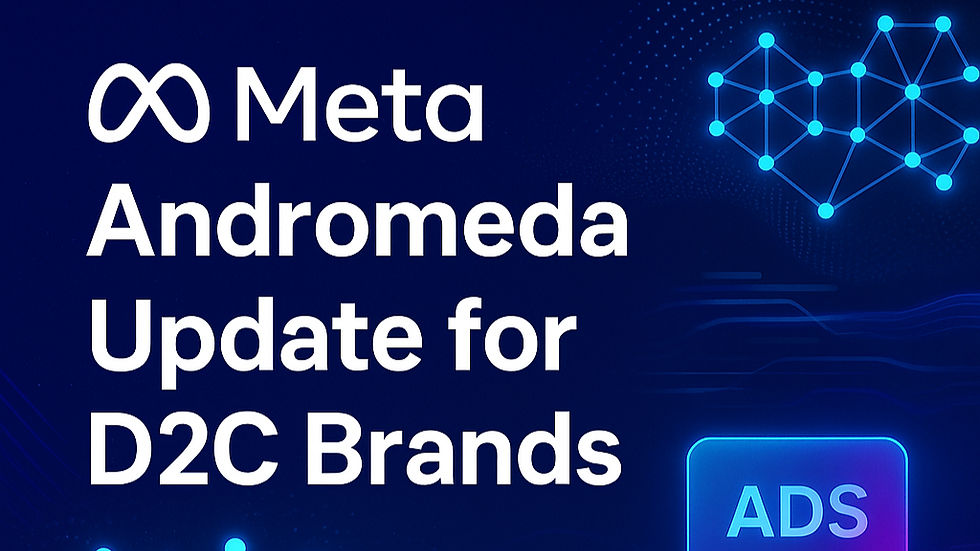Navigating the Transition from Google Ads' Similar Audience Segments: A Guide for Advertisers
- Janvi Mewani
- Jul 12, 2023
- 3 min read
Updated: Jan 29, 2024

Introduction:
On November 1, 2022, Google announced a significant change to its Google Ads services: the retirement of similar audience segments by August 2023. This decision has implications for advertisers and brands that heavily rely on these segments to drive successful campaigns. To ensure a smooth transition and maintain a strong Google Ads strategy, it's crucial to start preparing now. In this article, we will explore the concept of similar audiences, understand why Google is retiring them, and provide actionable steps to adapt and thrive in the evolving landscape of search engine advertising.
Understanding Similar Audiences and Similar Audience Segments:
Similar Audiences are Google-generated audience groups that resemble the behaviour and interests of an original audience list. By analyzing search activity within remarketing lists, Google identifies target audience segments with comparable search profiles to extend the reach of ads and drive more conversions. Similar audiences have been valuable for top-of-funnel strategies, providing highly engaged audience targeting.
Reasons for Retiring Similar Audience Segments:
Google's decision to retire similar audience segments is a response to the increasing demand for privacy among advertisers and end-users. Following a trend set by other platforms like Meta (formerly Facebook), Google aims to limit access to certain data, ensuring user trust and privacy. It's essential to recognize this industry-wide shift and prepare for the changes ahead.
Steps to Prepare for the Transition:
Leverage First-Party Data:
Start by leveraging your own first-party data, which holds higher integrity and aligns with privacy protection ethics. Collect data from multiple sources and incorporate it into your digital advertising and marketing efforts. This approach ensures compliance with privacy regulations while maintaining effective audience targeting.
Utilize Platform-Based AI:
Take advantage of artificial intelligence (AI) tools provided by Google Ads, such as Smart Bidding and audience filtering through machine learning. These platforms help optimize your audience targeting, save time, and reduce ad spend. However, before relying on them, conduct an integrity check to ensure accurate data collection.
Create High-Quality Content:
In the evolving landscape of search advertising, content remains a crucial component of a successful Google Ads strategy. Focus on crafting compelling and informative content that engages your target audience throughout their customer journey. A reliable Google advertising agency can assist you in creating high-quality content that drives results.
The Future of Search Advertising:
While the retirement of similar audience segments may require additional effort and adjustment, it does not spell the end of Google Ads services. Advertisers should anticipate changes and adapt their strategies accordingly. Here are some expected shifts in the landscape:
Eliminating Wasted Ad Spend and Audiences:
Businesses will need to optimize their customer lists and Smart Bidding strategies to avoid wasting ad spending on unnecessary audiences. Conducting regular inventory checks and fine-tuning your approach will help maintain a strong presence in search engines.
Leveraging AI and Automation Tools:
Automation tools and AI-driven systems will play an increasingly significant role in digital marketing success. Embrace these tools to automate tasks, optimize bidding strategies, and identify promising audiences swiftly. Consulting with a Google Ads agency, like ROI Magnet can help you stay up-to-date with the latest tools and strategies.
Race to Better Content:
With targeted ads becoming more limited, the competition to create compelling content will intensify. Invest in creating captivating ads that resonate with your target audience and drive clicks. Collaborating with a PPC ads agency like ROI Magnet can provide the expertise needed to stay ahead of the competition.




Previously, I doubted whether it was worth investing in SEO, but now I see that it was the right decision. The site began to bring in new clients, search positions have noticeably strengthened. Award-Winning https://marketing.link/seo-services/ the approach of specialists allowed us to avoid unnecessary costs and focus on the most effective tools. We continue to work, I am sure that the result will only get better.